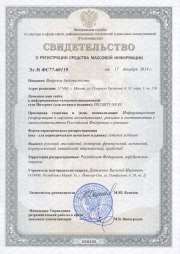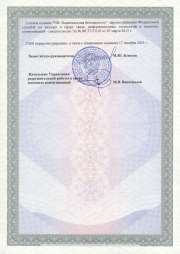|
MAIN PAGE
> Back to contents
Security Issues
Reference:
Duben A.K.
Technological sovereignty as the basis of the national security of the Russian Federation
// Security Issues.
2023. № 4.
P. 166-172.
DOI: 10.25136/2409-7543.2023.4.69347 EDN: JZMTQE URL: https://en.nbpublish.com/library_read_article.php?id=69347
Technological sovereignty as the basis of the national security of the Russian Federation
Duben' Andrei Kirillovich
Scientific Associate, Institute of State and Law of the Russian Academy of Sciences; Assistant, Department of Civil and Administrative Proceedings, Russian State University of Justice
119019, Russia, Moscow region, Moscow, Znamenka str., 10

|
k.duben@mail.ru
|
|
 |
Other publications by this author
|
|
|
DOI: 10.25136/2409-7543.2023.4.69347
EDN: JZMTQE
Received:
16-12-2023
Published:
31-12-2023
Abstract:
The subject of the study forms a set of legal acts of the Russian Federation, international treaties (agreements) regulating public relations in the field of of technological sovereignty, law enforcement practice, as well as the provisions of theoretical interdisciplinary research in this area. The research is devoted to an urgent topic in legal science. Technological sovereignty is a concept that assumes the ability of a state to control its technology, data, and digital infrastructure. This issue is of concern in an era of globalization and increasing dependence on technology, as the State seeks to maintain its technological independence and protect its interests in the digital sphere. The article examines the concept of technological sovereignty and its importance in the modern world, with an emphasis on the need to control data. The methodological basis of this work is a system of modern general scientific and private law methods. The study of the formation, development, place and role of technological sovereignty was carried out using the following general scientific methods: analysis and synthesis, abstraction and modeling, observation, generalization, description, classification, etc. The work used special private law methods of cognition of comparative law, formal law. To achieve the goals and objectives of this study, the author provides a brief analysis of existing methodological approaches to technological sovereignty as a concept in the general knowledge system, and also formulates the author's definition of this category. The author concludes that ensuring technological sovereignty will guarantee the national security of the Russian Federation, thereby creating conditions for countering new challenges, threats and risks: internal and external information threats when using digital technologies; developing destructive processes aimed at the information space of the Russian Federation, violation of the rights and freedoms of citizens, public safety and the state, as well as the tasks of ensuring the socio-economic development of the country and domestic digital technologies, the technological sovereignty of the Russian Federation.
Keywords:
technological sovereignty, information, independence, law and order, data protection, security, National security, competition, the concept, data security
This article is automatically translated.
You can find original text of the article here.
Achieving technological sovereignty in critical industries is currently the main task of the state, since ensuring sovereignty in this area will allow the state to control its technologies, data and digital infrastructure. This modern problem is of concern in the era of globalization and growing dependence on technology, as the state seeks to maintain its technological independence and protect its interests in the digital sphere in the face of new challenges, threats and risks. For the first time, the task of ensuring technological sovereignty was enshrined in the Fundamentals of the state Policy of the Russian Federation in the field of international information security for the period up to 2020, in which one of the tasks was "state policy in the field of creating conditions for ensuring the technological sovereignty of states in the field of information and communication technologies and overcoming information inequality between developed and developing countries." Earlier, Decree No. 259 of the President of the Russian Federation dated April 20, 2014 "On Approval of the Concept of State Policy of the Russian Federation in the field of international Development assistance" also provided for the tasks of creating conditions to ensure "technological sovereignty of recipient States in the field of information and communication technologies and overcoming information inequality between developed and developing states." It is worth noting that special attention is paid to the issue of technological sovereignty. In 2023, the Government of the Russian Federation submitted a draft federal law "On Technological Policy in the Russian Federation". This draft law is aimed at harmonizing scientific and industrial policy focused on the development of priority technologies determined by the state in accordance with market needs, as well as the creation of infrastructure for the free development of promising technologies. It is proposed to introduce special legal regimes that will exclude certain aspects from the general regulation in order to accelerate the development of technologies and ensure long-term changes in this direction. Thus, the draft law will help improve interaction between representatives of science and industry and create the basis for more successful implementation of investment projects in the field of scientific research, research and development. In our opinion, it is advisable to formulate separate provisions in this draft law concerning the organization and examination of technological sovereignty projects (for example, Federal Law No. 127-FZ of August 23, 1996 "On Science and State Scientific and Technical Policy"). Today, the national system requires additional measures to effectively ensure technological sovereignty, which is determined by the multi-vector development of public relations in the information sphere in modern conditions of digitalization, the formation of a multipolar world, increased confrontation and cyber attacks in the information space. Increased pressure from foreign hacker groups, an increase in the scale of computer attacks on the Russian infrastructure of software and equipment developers contributed to the actualization of achieving technological sovereignty of Russia and, accordingly, technical regulation of objects in the information space and rapid response measures to organizational issues to ensure Russia's technological sovereignty and optimize the management of technological and production processes of critical information infrastructure facilities. In this regard, the principle of implementing the policy of technological sovereignty in the field of information and communication technologies in order to ensure information security is particularly important. In accordance with Decree of the President of the Russian Federation No. 166 dated March 30, 2022, public authorities are prohibited from using foreign software on significant critical information infrastructure facilities belonging to them from January 1, 2025. Such software includes operating systems, virtualization environments, browsers, office software, DBMS, data analysis and visualization systems (BI systems) and software of the transport technological subsystem [1, p. 9]. In accordance with the Decree of the Government of the Russian Federation dated May 20, 2023 No. 1315-r "On approval of the Concept of Technological Development for the period up to 2030", technological development is carried out through an integrated, systematic approach to the organization of the innovation cycle, thereby technological sovereignty is considered as a certain level of independence of the country from foreign manufacturers and service providers in the fields of science technology, which ensures the unhindered realization of national interests in the information sphere, taking into account existing and foreseeable threats. The President of the Russian Federation noted: "In a short period of time, Russia will have to create or bring to a new level its own critically important technologies in microelectronics, the IT industry, transport, in the development of medicines and new materials, and in other areas that are important for the country" [2]. At the same time, the Chairman of the Federation Council of the Federal Assembly of the Russian Federation noted that achieving technological sovereignty in critical industries is the main and main task of the state, which should involve all forces [3]. Ensuring technological sovereignty will further reduce dependence on imports, which, in turn, will affect the development of its own information infrastructure. Regulatory and legal regulation in this area is aimed at the development of domestic production of information and communication technologies through the use of protectionist methods that contribute to reducing the share of imports of foreign products and replacing these products with similar Russian-made goods. Thus, it will further increase the competitiveness of domestic information products, including information security tools, as well as increase the number of jobs in relevant sectors of the economy.
In our opinion, in order to ensure technological sovereignty in the information sphere, it is necessary to focus on the development of domestic technical means and information and communication technologies, which will minimize the share of foreign information products imported from foreign countries. This is especially important in relation to information security tools and the implementation of import substitution policy. Such measures will make it possible to achieve the implementation of tasks in several directions at once: economic growth and development of the country, ensuring sovereignty and the possibility of conducting an independent state policy in the interests of the Russian Federation. At the same time, while ensuring digital sovereignty, it is necessary to build an information technology system that protects information from leakage when using information technologies from foreign countries. It should be particularly noted that in the context of the transformation and digitalization of law, there is a need to define the concepts of "digital sovereignty" and "technological sovereignty". These definitions do not have legal certainty today, despite their key importance in the field of information security. Thus, in the Order of the Ministry of Industry and Trade of the Russian Federation dated May 29, 2019 No. 1869 "On approval of the concept of creating the Russian segment of the Eurasian network of Industrial cooperation and Subcontracting", one of the main tasks of the Russian segment of industrial cooperation is to ensure digital sovereignty to protect information in accordance with Russian legislation, however, this definition is missing in the above-mentioned act. At the same time, we believe that the definition of "technological sovereignty" should be understood as the ability of the state to possess technologies that are considered critically important for ensuring the welfare and competitiveness of the state and the unhindered realization of national interests, taking into account existing and future threats. It should be noted that in most cases the state expresses this definition through national identification on the Internet [4, p. 32]. At the same time, the blocking of some information resources on the Internet is interpreted as an expression of digital sovereignty. Undoubtedly, in the new geopolitical conditions of global technological transformation and extraterritoriality, the importance of digital sovereignty is increasing to ensure the security of the state. It is necessary to agree with the position of individual authors that the presence of digital sovereignty contributes to the protection of one's own national segment of the public, political, socio-economic space, and in modern conditions the level of state sovereignty as a whole depends on digital sovereignty [5, p. 208]. We believe that digital sovereignty, on the one hand, is a component of technological sovereignty, and on the other hand, it is fully based on the latter. In our opinion, in the presence of a large number of cyber attacks and individual threats, digital sovereignty is the ability of an independent sovereign state to independently determine the degree and method of participation in information activities when using digital technologies to realize its own interests and counter illegal actions in the national information space. These conclusions show the connection of information risks with potential threats to Russia's national security. A.H. Valeev draws attention to the fact that the Internet information and communication network acts as a platform for the exchange of opinions of individuals, thereby this platform has negative factors for the dissemination of false information and propaganda of ideological opinions, which generally threaten certain social groups, society and the state as a whole [6, p. 125]. A similar point of view was held by I.L. Bachilo, who in her works repeatedly drew attention to the transformation of information platforms, which, in turn, affect constitutional human rights in terms of freedom of speech and thought [7, p. 286]. At the same time, the technological sovereignty of the state in modern conditions will allow achieving information freedom within the framework of ensuring national security. In turn, in the new geopolitical conditions, the state policy in the field of information security has changed. Currently, the problem of ensuring information security is of paramount importance and requires the adoption of new legal solutions. One of the main ways to address cybersecurity issues was the creation of an Interdepartmental Commission of the Russian Security Council on ensuring the technological sovereignty of the state in the field of critical information infrastructure development. According to the Decree of the President of the Russian Federation dated April 14, 2022 No. 203 "On the Interdepartmental Commission of the Security Council of the Russian Federation on ensuring technological sovereignty of the state in the field of development of the critical information infrastructure of the Russian Federation". The Commission carries out activities on the formation of security measures for critical infrastructure and control over government agencies whose powers include issues of ensuring the technological independence of information infrastructure facilities. Analyzing the dynamics of cyberattacks on domestic information facilities, it is impossible not to note the importance of the activities of the above-mentioned special public authority, which on an ongoing basis carries out forecasting, identification and assessment of internal and external risks and threats affecting national security in the field of development and improvement of information technologies. Thus, ensuring technological sovereignty will ensure the national security of the Russian Federation, thereby creating conditions for countering: internal and external information threats when using digital technologies; developing destructive processes aimed at the information space of the Russian Federation, violation of the rights and freedoms of citizens, the security of society and the state, as well as the tasks of ensuring socio-economic development the country and domestic digital technologies, technological sovereignty of the Russian Federation.
References
1. Tereshchenko, D.V. (2022). Digital transformation. Actual tasks, 5(464), 9-10.
2. Putin called for ensuring Russia's technological sovereignty. RIA Novosti. Retrieved from https://ria.ru/20230208/putin-1850583456.html
3. V. Matvienko: All the forces of the state, science and business should be directed towards achieving technological sovereignty in critical sectors. The Federation Council. Retrieved from http://council.gov.ru/events/main_themes/139867
4. Kasenova, M.B. (2014). Identification of persons on the Internet and cyberspace of social networks. Lawyer, 6.
5. Nikonov, V.A., Voronov, A.S., Sazhina, V.A., Volodenkov, S.V., & Rybakova, M.V. (2021). Digital sovereignty of the modern state: content and structural components (based on the materials of an expert study). Bulletin of Tomsk State University of Philosophy. Sociology. Political science, 60.
6. Valeev, A.H. (2011). The fight against the manifestation of extremism on the Internet. Business in law, 6.
7. Bachilo, I.L. (2001). Information law: fundamentals of practical informatics. Moscow.
Peer Review
Peer reviewers' evaluations remain confidential and are not disclosed to the public. Only external reviews, authorized for publication by the article's author(s), are made public. Typically, these final reviews are conducted after the manuscript's revision. Adhering to our double-blind review policy, the reviewer's identity is kept confidential.
The list of publisher reviewers can be found here.
A scientific article submitted for review on the topic: "Technological sovereignty as the basis of the national security of the Russian Federation" is an urgent study of an important problem of the national security of the Russian state and society. In the reviewed article, the authors define the purpose of the study and its tasks, substantiate the relevance. In particular, the authors emphasize that increased pressure from foreign hacker groups, an increase in the scale of computer attacks on the Russian infrastructure of software and equipment developers should contribute to the actualization of achieving technological sovereignty of Russia and, accordingly, technical regulation of objects in the information space and rapid response measures to organizational issues to ensure technological sovereignty of Russia and optimize the management of technological and production processes of critical information infrastructure facilities. In this regard, the principle of implementing the policy of technological sovereignty in the field of information and communication technologies in order to ensure information security is particularly important. The subject of the research in the reviewed article is the problem of technological sovereignty of the Russian Federation in the new geopolitical conditions. The emphasis is placed on a fundamental change in state policy in the field of information security and the need to develop and adopt new legal solutions. The author's attention is paid to the main provisions of the draft federal law "On Technological Policy in the Russian Federation". Recommendations have been developed and proposed. In particular, to introduce special legal regimes that will exclude certain aspects from the general regulation in order to accelerate the development of technologies and ensure long-term changes in this direction. Thus, the draft law will help improve interaction between representatives of science and industry and create the basis for more successful implementation of investment projects in the field of scientific research, research and development. The article is distinguished by its methodological base and the sources used. In particular, the analysis of the research source base showed that a fairly modest number of scientific papers (only 7 positions) from different years were used in the preparation of the peer-reviewed article. Some of them are ten or even twenty years old. As we understand it, the article is mostly aimed at using conceptual, strategic documents and individual federal laws and their drafts. However, the authors still managed to find a place to analyze the theoretical basis of the study and present the author's understanding, for example, of the definition of "technological sovereignty" and justify it. The article is logical. The article is written in good language and is able to arouse the reader's interest. Thus, based on the above, we believe that the peer-reviewed scientific article on the topic: "Technological sovereignty as the basis of the national security of the Russian Federation" meets the necessary requirements for this type of scientific work and can be recommended for publication in the desired scientific journal.
Link to this article
You can simply select and copy link from below text field.
|
|





